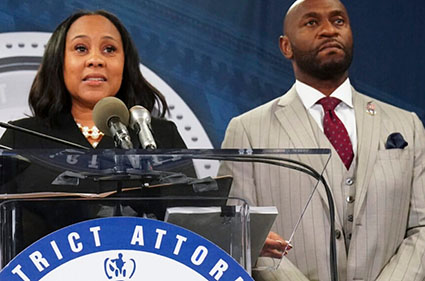by WorldTribune Staff, September 4, 2023
The special prosecutor tapped by Fulton County District Attorney Fani Willis to lead the Georgia case against former President Donald Trump is a veteran personal injury attorney who appears to have limited experience trying high-profile cases.
Records show Willis has paid Nathan J. Wade, who was hired to handle the Trump case last year, $548,977, according to Open Checkbook.

Wade is an Atlanta-area personal injury and criminal defense lawyer. In 1999, he spent four-months as an assistant solicitor in the Atlanta suburb of Cobb County. In Georgia, solicitors generally prosecute matters such as misdemeanors and traffic citations.
Wade also served as a special assistant attorney general for the state. Such lawyers are usually tasked with taking cases when the attorney general’s office does not have enough staff to handle a case, or when a case requires specialized knowledge.
From 2011 to 2021, Wade was an associate municipal court judge in Marietta, handling cases such as city ordinance violations and misdemeanors.
On numerous occasions, according to local news articles, Wade unsuccessfully ran for superior court judge.
According to his profile on the State Bar of Georgia website, he attended John Marshall Law School in Chicago, which was later incorporated into the University of Illinois at Chicago.
Wade also played a key role in the case of Georgia’s so-called “alternate electors” for Trump in the 2020 election.
“At Least Eight Trump Electors Have Accepted Immunity in Georgia Investigation,” major media headlines uniformly blared in May.
“The legacy outlets echoing that narrative, however, buried the lede, which is that Fulton County’s get-Trump district attorney can’t even find incriminating evidence against the former president when she grants immunity to targets of her criminal investigation,” The Federalist noted.
“A strong secondary story, also ignored or downplayed by the left-wing media, reveals multiple incidents of alleged misconduct by the D.A.’s office.”
Wade was at the center of the immunity offer controversy, the report noted.
Wade “interviewed two electors and then canceled a third interview before unexpectedly subpoenaing the Republicans to testify before the grand jury,” the report said.
A legal dispute between Wade and defense attorneys for the electors ensued over the extent to which the Fifth Amendment’s right against self-incrimination protected the electors from being forced to respond to questions before the grand jury. “Before the court had a chance to rule on the matter, however, Wade informed the court that the DA’s office intended to offer immunity to one or more of the electors,” Margot Cleveland wrote for The Federalist.
On April 7, 2023, Wade provided draft immunity agreements for eight of the 10 electors represented by attorney Kimberly Debrow. The two not offered immunity opted to obtain new legal representation, and Debrow’s remaining eight clients then accepted the revised immunity offers. Thereafter, seven of the eight electors sat for recorded interviews with Wade questioning them on behalf of the DA’s office and with Debrow representing them.
During Wade’s questioning, “Debrow claims he attempted to mislead and confuse her clients by suggesting the DA’s office had previously made an actual offer of immunity in late 2022, as opposed to merely floating the potential for an immunity deal,” The Federalist report said. “In one case, Debrow detailed how, when she attempted to clarify for her client Wade’s misleading questions, the prosecutor threatened to leave, rip up the immunity agreement, and indict the elector.”
Cleveland noted in the report: “The corporate media were likewise content to ignore the allegations of serious misconduct. Those included Willis’ misrepresentation to the court about whether the electors’ attorney had informed them of the prior immunity discussion and Wade’s alleged attempt to mislead and intimidate one of the witnesses by threatening to indict him.
“Wade’s involvement here is particularly ironic given that a Fulton County judge held the special prosecution team could no longer investigate one of the electors, then-state Sen. Burt Jones, because Willis had hosted and headlined a fundraiser for Charlie Bailey — a Democrat seeking to challenge Jones in the general election for lieutenant governor. Wade, like Willis, had donated to Bailey’s campaign.”
Please Support Real Journalism
Hello! . . . . Intelligence . . . . Publish
